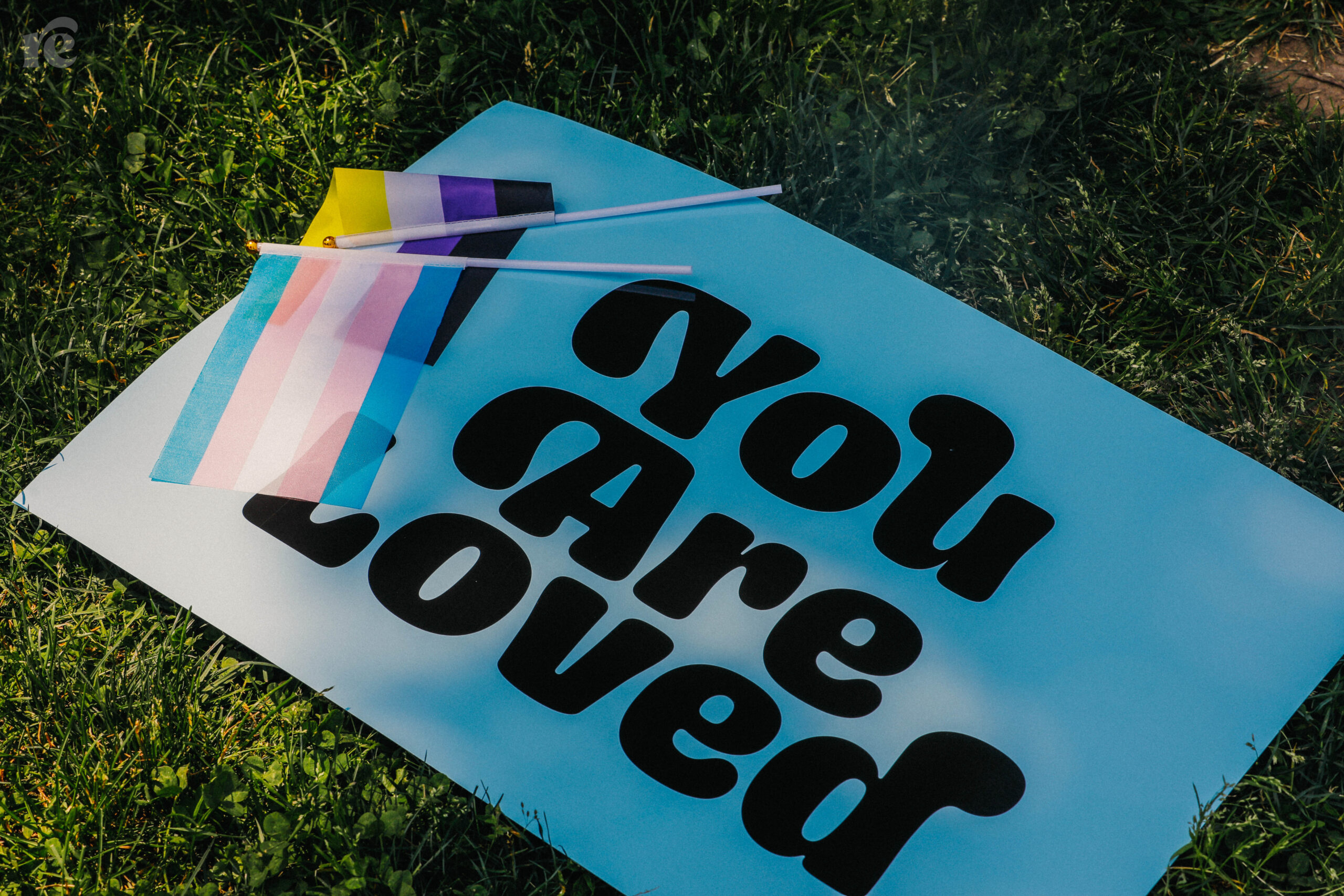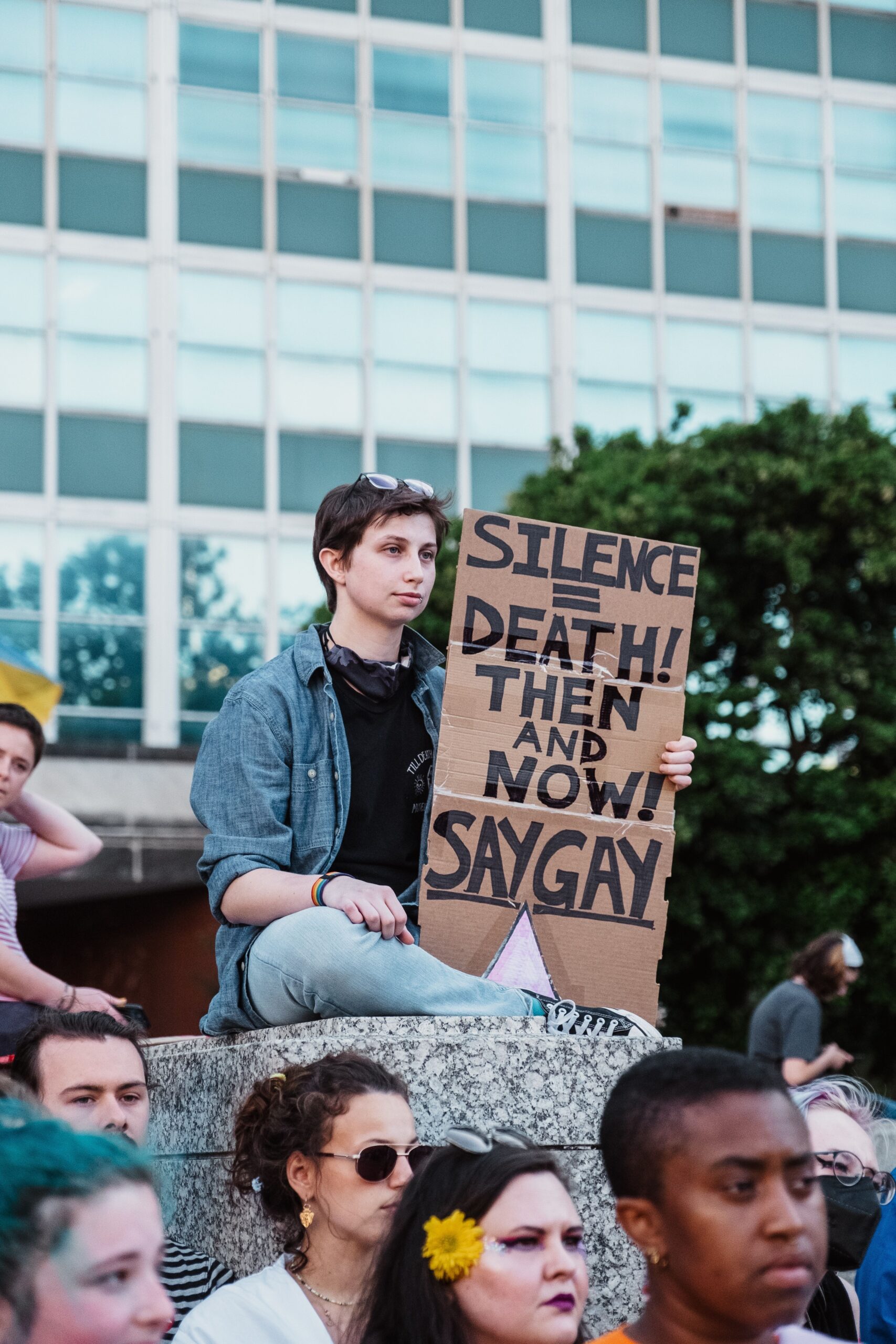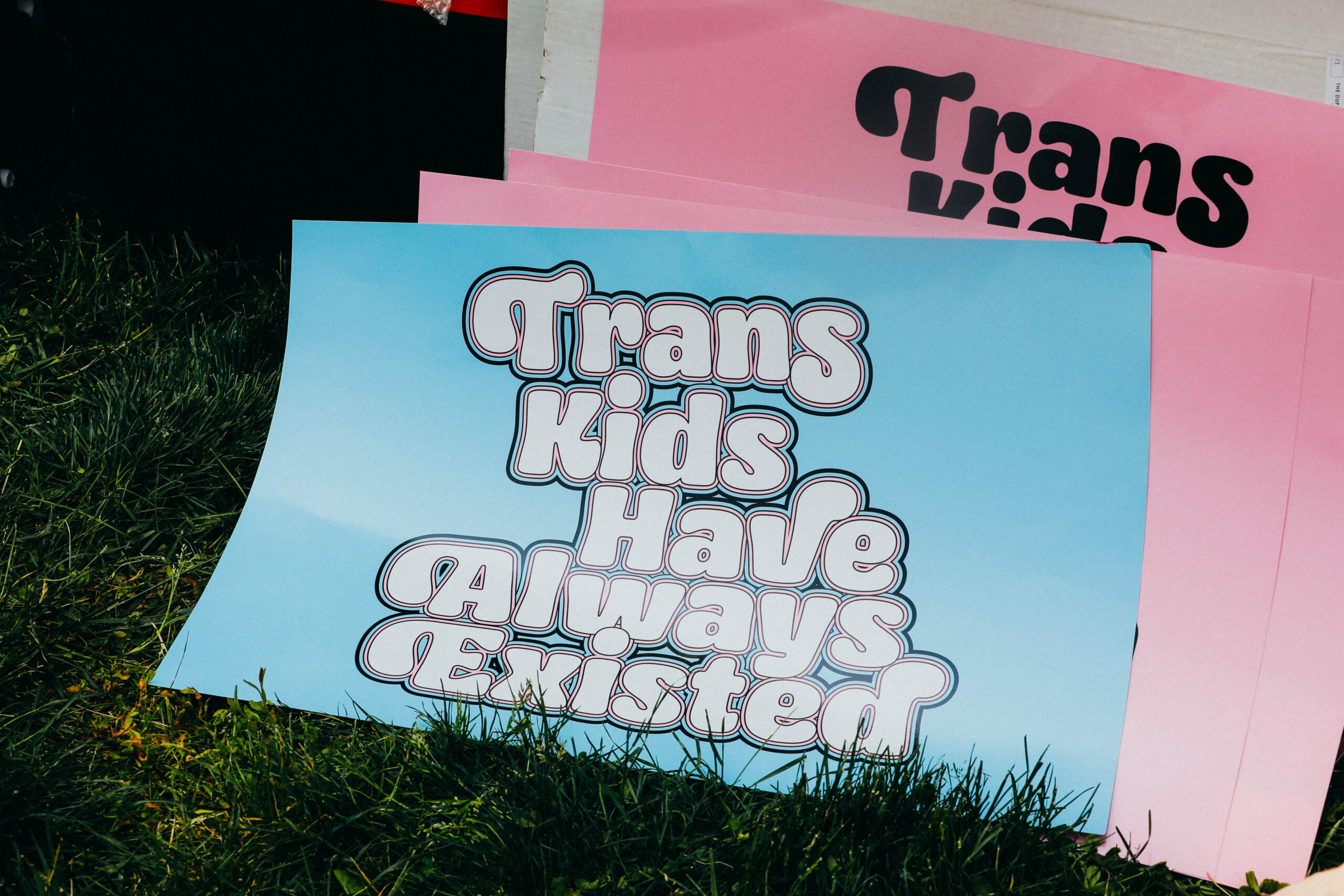[ad_1]
That is half one in a two-part collection. Examine again tomorrow for half two.
Since January, state legislatures have proposed greater than 500 items of anti-LGBTQ+ laws. These payments primarily search to criminalize transgender kids, mother and father, and their households.
Fascist teams and conservative lawmakers have concurrently ramped up propaganda falsely alleging that LGBTQ+ individuals are extra more likely to hurt kids—a pernicious delusion that has triggered many years of hurt to trans and queer communities. In actuality, folks raised by queer and trans caretakers have related well-being to those that haven’t.
The kids of LGBTQ+ folks, alongside queer and trans youngsters, are ostensibly on the middle of this legislative agenda. In fact, “we are sometimes erased in these conversations,” mentioned Jordan Budd, government director of COLAGE, the biggest U.S. group for the youngsters of LGBTQ+ folks and the primary Black, queer individual within the position. He has a bisexual beginning father.
“Homosexual mother and father exist, and their youngsters are sufficiently old to talk for themselves,” Budd mentioned.
I talked to a handful of grownup kids and grandchildren of queer and trans folks—lots of whom are LGBTQ+ themselves—to listen to their experiences of household, discrimination, and care. They arrive from a spread of household and cultural backgrounds, and most grew up within the Midwest and South. And so they all have connections to COLAGE, that means they characterize a politically energetic group with the sources to entry a nationwide nonprofit.
I first spoke to them in Might 2022; I checked again early this 12 months. I additionally talked to students and authorized specialists, who helped contextualize how state violence, household legislation, and institutional racism form LGBTQ+ households’ lives.
I’m a queer, cisgender white lady in my early 30s, raised by straight mother and father, dreaming—with equal components trepidation and hope—about what household might seem like for me and for queer communities throughout the US.
Most of the folks I talked to expressed a way of whiplash. On one hand, rising social acceptance in the US has led to extra queer and trans folks popping out: As of 2022, 7 % of Individuals recognized as LGBTQ+. This contrasts with a surge in anti-LGBTQ+ laws, propaganda, and violence—which many name a conservative backlash to advances in queer and trans rights in addition to racial justice.
The LGBTQ-parented folks I spoke to shared a imaginative and prescient of the queer motion that facilities trans folks and other people of shade.
“A variety of the faces of marriage equality and household acceptance have been white, cis queer people,” mentioned Adrian Ogle, a queer baby of a queer mother and a COLAGE board chair emeritus who works in philanthropy. “We need to proceed to interrupt that paradigm. We’re product of a multiplicity of households and backgrounds and experiences.”
Present anti-LGBTQ+ laws is a part of a protracted historical past of the U.S. authorities policing marginalized, notably Black and Indigenous, households. In distinction, the multilayered experiences of the youngsters of LGBTQ+ folks—and their refusal to flatten their humanity to suit heteronormative constructs—problem society at massive to think about extra expansive and inclusive types of household, neighborhood, and care.
Half considered one of this two-part collection appears to be like at who LGBTQ+ households are, and the way histories of institutional racism form immediately’s anti-trans and queer laws. Half two will look at how discrimination shapes queer and trans households’ each day lives, and the way the youngsters of LGBTQ+ folks assist each other as they advocate for a extra liberated world.
Who’re LGBTQ+ households?
Analysis establishments have traditionally marginalized correct info on gender and sexuality—and up to date state laws censoring the research of gender and race exacerbates this. So it’s laborious to know precisely how many individuals in the US are parented by LGBTQ+ folks.
As of 2015, researchers estimated that as much as 3.7 million U.S. kids underneath age 18 have at the least one LGBTQ+ mother or father. Fifteen % of individuals in same-sex {couples} within the nation are elevating a baby. And the neighborhood of queer- and trans-parent households is more likely to develop, as LGBTQ+ individuals are popping out extra usually and earlier, and lots of are planning to have kids.
LGBTQ-parented folks of all genders and sexualities might describe themselves as culturally queer, as having a queer household construction, or as queerspawn. The tongue-in-cheek time period reclaims the disgust society usually directs in opposition to trans and queer households—a lot as LGBTQ+ activists reclaimed the once-slur “queer.”

The grownup kids of queer and trans caretakers usually tend to be LGBTQ+ themselves. That is doubtless as a result of their mother and father create a extra affirming surroundings by which kids can embrace their identities, College of Amsterdam Professor Henny Bos mentioned. She’s a co-investigator of the Nationwide Lesbian Longitudinal Household Research, which has adopted a U.S. group of individuals with lesbian mother and father because the Nineteen Eighties.
Dominant media accounts and even LGBTQ+ nonprofits usually depict queer folks parenting inside monogamous, same-sex, largely white {couples}. In actuality, queer households are as various as queer folks. For instance, solely 3 % of bisexual mother and father are in same-gender {couples} (a 3rd are in different-gender relationships, and most are single). LGBTQ+ folks mother or father solo, in same- or different-gender {couples}, as a part of non-monogamous relationships, or as caretakers to younger folks of their communities, whether or not or not they’re biologically or legally associated.
One among my interviewees was adopted by an out homosexual couple; one was raised by his mom and discovered his beginning father was queer later in life. The others had mother and father in seemingly heterosexual {couples}, who broke up after one companion got here out as queer or transgender.
Charges of parenting differ based mostly on sexual orientation and gender identification. Queer girls are greater than twice as more likely to be mother and father than queer males (research usually don’t distinguish between cis and trans women and men). The scant out there information inform us that about 19 % of transgender adults are mother and father, and the vast majority of trans folks need kids sooner or later.
Black, Indigenous, and Latinx queer individuals are extra more likely to care for youngsters than queer folks of different races and ethnicities. In a single research of individuals in same-sex relationships, 41 % of ladies of shade and 20% of males of shade cared for youngsters underneath 18—round twice as many as their white counterparts. LGBTQ+ folks of shade residing within the Midwest, Mountain West, and South kind the biggest group of LGBTQ+ households.
Cultural conceptions of kinship form LGBTQ+ households. For instance, folks of shade in the US are extra doubtless than white folks to reside in multigenerational households. In Black communities, “Somebody’s your auntie, somebody’s your uncle, somebody’s your cousin, whether or not organic or not,” Ogle mentioned. Additional, in lots of Native American communities, Two Spirit folks play integral roles in caring for youth.
This historic and modern range reveals us that removed from being the norm, the heterosexual, two-parent nuclear household, by which neither mother or father has been divorced, is definitely a minority household construction.
Nevertheless it’s a household construction that state establishments have, traditionally and immediately, enforced.
Policing households
When authorized scholar and American College professor of legislation emerita Nancy Polikoff first began practising LGBTQ+ household legislation within the Nineteen Seventies, baby custody was “probably the most crucial difficulty dealing with lesbians” within the authorized area, she mentioned.
Many lesbians married and had kids with males, then got here out and acquired divorced. Ex-husbands, kin, and state companies usually tried to terminate moms’ parental rights on the premise of homophobic beliefs. One individual I spoke to, now of their late 20s, mentioned that, throughout their mother and father’ divorce proceedings after they have been a baby, attorneys argued their mom was an “unfit” mother or father as a result of she was queer.

Each the menace and actuality of compelled separation are profoundly traumatic for youngsters.
Attorneys of Polikoff’s era used ingenious authorized methods to construct case legislation affirming LGBTQ+ parental rights.
“As a result of we had nothing to rely upon, we made all of it up,” mentioned Michele Zavos, co-founder of Rainbow Households (one of many first U.S. teams for lesbians contemplating parenthood), who began practising LGBTQ+ household legislation within the Nineteen Eighties.
Attorneys helped win authorized protections that 1000’s of LGBTQ+ households profit from immediately: second-parent adoption, non-discrimination legal guidelines, and marriage rights.
But the menace to LGBTQ+ households by no means went away. It’s intertwined with systemic racism. State companies are way more more likely to take away Black and Indigenous kids from their households than white kids. And analysis reveals that authorities companies are 4 instances extra more likely to take away lesbian and bisexual Black girls’s kids from their households and into state custody as these of heterosexual Black girls.
In the meantime, latest laws makes use of the language and infrastructure of kid welfare to surveil and police transgender kids and fogeys. For instance, Florida’s SB 254, proposed in early March, would give courts the facility to take kids from their mother and father if the state believes the kid might obtain gender-affirming medical care. The preliminary textual content of the invoice additionally permits courts to take youngsters from their mother and father if their mother and father or siblings obtain gender-affirming care—offering an avenue to criminalize trans parenthood. In reality, gender-affirming care is lifesaving, and significantly enhances the well-being of each trans kids and trans mother and father.
In accordance with state companies, compelled separations are in response to allegations of parental abuse and neglect. However researchers and the lived expertise of affected households inform us that state companies regulating parenting overwhelmingly goal and police poor households of shade who don’t conform to white, middle-class, cisgender, and heterosexual household buildings.
“The kid welfare system has traditionally and immediately punished households who don’t meet that norm”—notably Black and Indigenous households, mentioned Dorothy Roberts, a professor of Africana Research, legislation, and sociology on the College of Pennsylvania. Roberts has revealed extensively on household policing, and is a number one tutorial voice within the motion for household policing abolition.
Case information supply proof of widespread discrimination in opposition to LGBTQ—and notably transgender—mother and father, particularly mother and father of shade and people residing in poverty. In information from a 2017 Kansas custody case Polikoff analyzed, a case employee informed a lesbian mom she wanted to be “mounted” and “return to loving a person”; a choose terminated her parental rights two years later. In one other Kansas case, by which the state eliminated a transgender baby from the kid’s lesbian mother and father, a social employee repeatedly mentioned “we’re not giving this baby again to lesbians;” the choose positioned the kid in foster care.
Lawmakers laid the foundations of household policing after Reconstruction, when courts eliminated Black kids from their mother and father and compelled them to work as “apprentices” for white plantation house owners—reenslaving them, Roberts mentioned. The federal government weaponized baby removing within the genocide of Native Individuals, forcing Indigenous kids into abusive residential colleges.
By claiming “baby welfare” to police transgender kids and caretakers, state legislators invoke a bigger infrastructure—together with felony, household, and immigration courts—that disproportionately criminalizes impoverished Black, Indigenous, and different communities of shade. And so they additional state-sanctioned medical gatekeeping and coercion, that are rooted in systemic racism and notably hurt folks with disabilities and trans folks.
U.S. courts are way more more likely to incarcerate queer folks, particularly transgender folks, than their heterosexual, cisgender friends of the identical racial and financial teams. One research discovered that 44 % of incarcerated LGBTQ+ individuals are mother and father; social scientists have devoted little analysis to what number of of their kids find yourself in foster care.
The menace and act of kid removing are methods “to terrorize politically marginalized communities,” Roberts mentioned. In gentle of this, “It’s so essential that individuals see these latest assaults on trans households as a part of a broader spectrum of harms to households attributable to this technique, after which that we be a part of collectively and never see these as separate actions,” she mentioned.
Reclaiming the narrative
Many individuals I interviewed—particularly these with transgender mother and father, and queer mother and father of shade—mentioned they skilled profound stress to characterize their mother and father in keeping with cisgender, heterosexual household norms.
“It’s like, ‘Oh, when you don’t have an ideal household, you’re undoubtedly not match to be a mother or father,’’ mentioned Olivia Bartholomaei, a nonprofit employee and COLAGE volunteer with a transgender mother or father. In actuality, Bartholomaei mentioned, folks with trans mother and father have distinctive, particular person relationships with these mother and father—like everybody does. There aren’t any important variations in well-being and happiness between trans and cis parent-child relationships, apart from the consequences of systemic transphobia.

The stress to characterize one’s mother or father creates a “super psychological burden” for trans and queer folks’s youngsters, mentioned Kenji Kuramitsu—an remark social science analysis affirms. Kuramitsu is a queer, Chicago-based therapist and COLAGE board member with a lesbian mother or father.
This stress additionally shapes the narratives that researchers and journalists inform about LGBTQ+ households. I requested Bos, the lesbian households researcher, how propaganda in opposition to LGBTQ+ mother and father impacts how she presents her outcomes. When discussing her information on the sexual orientations of the lesbian-parented folks in her research, “I’m at all times beginning—and I don’t know why—I’m at all times beginning with saying that almost all is heterosexual. It appears to be like like I’m internalizing one thing myself.”
Queer and trans identities are regular human expressions, a part of the huge historic and international range of gender and sexuality. Information indicating that the grownup kids of LGBTQ+ mother and father usually tend to be LGBTQ+ themselves factors to an affirming surroundings for youngsters’s identification improvement. However propaganda just like the false and dangerous “groomer” slur could make illustration excessive stakes for neighborhood members, researchers, and journalists, together with me.
My interviewees expressed a yearning for genuine tales that give house for LGBTQ+ households’ complicated, typically messy, at all times precious, human lives. Bartholomaei discovered these tales in neighborhood areas for people with trans mother and father.
“It’s been actually reaffirming to be like, nobody’s excellent,” together with cis and hetero households, she mentioned. “Any queer individual is a person as effectively. There’s no mildew to be a human.”
Kuramitsu credit areas like COLAGE with serving to him rejoice trans and queer households in all their complicated authenticity. This expertise of neighborhood—past “the neat, Supreme Courtroom transient sign-on, media clip story”—sustains him.
“That has allowed me to proceed doing work on this planet: understanding there’s a neighborhood of parents who fly sooner than I can fall if I want assist—and to whom I can even prolong solidarity and care,” Kuramitsu mentioned.
Ray Hobbs contributed editorial suggestions as a sensitivity reader.
[ad_2]
Source link



